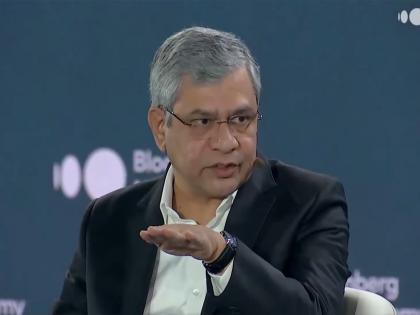India's approach to affordable computing facilities is to ensure democratisation of technology: Ashwini Vaishnaw
By ANI | Updated: November 20, 2025 18:45 IST2025-11-20T18:43:29+5:302025-11-20T18:45:03+5:30
Singapore, November 20 : Union Minister of Electronics and IT Ashwini Vaishnaw, on Thursday, highlighted India's approach to a ...

India's approach to affordable computing facilities is to ensure democratisation of technology: Ashwini Vaishnaw
Singapore, November 20 : Union Minister of Electronics and IT Ashwini Vaishnaw, on Thursday, highlighted India's approach to a common, affordable computing facility to democratisate technology, ensure equitable access, and drive inclusive growth.
This vision is being realised through the creation of common, high-performance computing facilities and the IndiaAI Mission. Launched in March 2024, this mission aims to make artificial intelligence accessible to all by establishing a robust and inclusive AI ecosystem.
While speaking at the Bloomberg New Economy Forum in Singapore, Minister Vaishnaw discussed the national common computing facility, equipped with around 38,000 GPUs.
He said a national common computing facility equipped with around 38,000 GPUs is now available to researchers and students at a cost of less than one US dollar. He emphasised that this initiative has effectively equalised access to infrastructure and opened up opportunities in AI-related development.
Ashwini Vaishnaw further noted that the current AI landscape spans three categories: large general-purpose models, small domain-focused industry models, and new research; each of these presents significant opportunities for India's technology ecosystem.
"Our Prime Minister says we must democratise the technology, and this is what we have done, giving a large number of opportunities to a pool of researchers and innovators," he said.
During the conversation, Minister Vaishnaw highlighted that three technology-dominated countries, namely, the United States, China and India, will drive the future.
"India's design capabilities, ability to look at very complex problems and solve them, and the ability to have a talent pool, which can be deployed in any major technological field, will hold us very strong going forward," he added.
The minister highlighted the development in the semiconductor industry that India recorded in the last 3 years, as well as the space sector, where he said nearly 80 startups are now working in space technologies.
He also talked about India's achievement in the startup sector, saying, "Just about 10 years ago, India had only about 400 to 500 startups. But today, the country accounts for over 190,000 startups, and it is among the top three startup ecosystems in the entire world."
To avoid concentrating technological development in a few major cities, the government is expanding AI labs, 5G labs, and semiconductor training facilities to Tier 2 and Tier 3 cities. The government is fostering the development of indigenous AI models and hardware, such as the THEJAS64 indigenous 64-bit SoC processor, to ensure self-reliance and data sovereignty.
"In the last decade, so much simplification has happened, and so many constraints have been removed, leading the entrepreneurial energy to come forward. This is driving the technology and innovation in India," he said.
Disclaimer: This post has been auto-published from an agency feed without any modifications to the text and has not been reviewed by an editor
Open in app